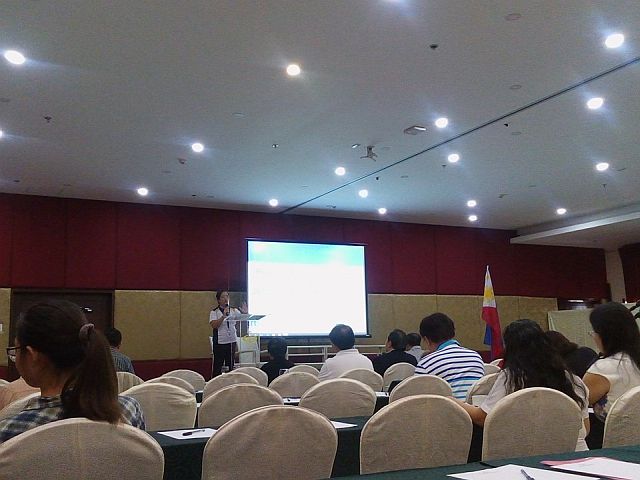
BOI Cebu OIC Ellorence Cruz speaks before stakeholders at the BOI roadshow in Cebu. (CDN PHOTO/VICTOR ANTHONY V. SILVA)
THE Board of Investments’ (BOI) move to expand its coverage on the manufacturing segment under its Investment Priorities Plan (IPP) for 2017 will help the local economy to grow.
This was the reaction of the local business leaders as they welcomed the BOI’s move.
Melanie Ng, Cebu Chamber of Commerce and Industry (CCCI) president, said this will support domestic growth and attract more investments.
“In light of the continued growth of the services sector, especially our ICT-BPO (information communication technology-business process outsourcing) industry, the local buying power has substantially increased,” she said.
The BOI, during a public consultation on the draft IPP in Cebu City last Monday, announced an expanded coverage of the manufacturing segment among its preferred investment activities starting next year.
Unlike past IPPs wherein the only manufacturing projects eligible for registration are either export-oriented or listed as strategic in specific categories, the upcoming policy will include activities that will cater to the growing demand of the domestic market.
In current IPP, only eight products were listed as eligible for registration with the BOI including car parts, aerospace parts, ship building, tool and dye and some chemicals, among others.
BOI is now proposing to cover practically all manufactured products, except for those that may be against policies of the current administration such as cigarettes, among others.
The BOI, an attached office of the Department of Trade and Industry (DTI), is the government’s main investment arm that registers projects qualified for fiscal and non-fiscal incentives such as tax holidays, duty-free importation of capital equipment and employment of foreign nationals, among others.
Ng said said that by providing tax incentives to more manufacturers, more investors will also be interested to look at possibilities of engagement in the local supply chain.
The chamber leader urged government to continue spending more on infrastructure as this will have a positive impact on the economy and support local industries.
Maximo Richohermoso, chairman of the Seaweed Industry Association of the Philippines (SIAP), said tax incentives to more local manufacturers will help them become more competitive with imports.
He said the Philippines has local toothpaste manufacturers, but most consumers use products imported form Thailand or Malaysia.
“By giving incentives to local manufacturers, they can expand production volume and lower their manufacturing overhead. This will allow them to be more competitive with foreign competitors,” he said.
Unfortunately for manufactured seaweed products, domestic sales account for only two percent or less than $5 million of total export sales of $250 million.
Nonetheless, he said BOI incentives will still have an impact on the industry as it can help reduce capital cost and help local producers compete with leading seaweed manufacturer Indonesia.
Richohermoso is also the president of MCPI Corp., one of the country’s biggest carrageenan (seaweed extract) manufacturers, based in Consolacion town, northern Cebu.
While Philip Tan, past president of the Mandaue Chamber of Commerce and Industry, welcomed the latest BOI initiative, he said that not many micro- to small-scale enterprises will benefit from it.
“Registering with the BOI is not easy. There is a set of criteria in order for a company to be registered. I think only the large corporations will benefit, maybe even some of the medium,” he said.